- 54% of local marketers never used Twitter as a marketing channel.
- 49% of local marketers that were Twitter users now use Twitter/X less or not at all since its takeover.
- 63% of local marketers find Facebook to be the most effective marketing channel.
It may not be over yet, but I have a feeling that when we look back on the top marketing stories of 2023, X is going to be up there somewhere. Twitter user or not, you’d have done well to avoid headlines around brutal lay-offs, controversial changes, and, of course, that rebrand.
As dramatic as it may have been, we’ve been interested to know how things have really changed on the ground for local marketers. Personal feelings aside, does all this have any impact on how businesses and agencies reach their audience?
So, we polled 180 local marketers to find out how their usage of Twitter/X has changed since the takeover began in late 2022.
A brief timeline of Twitter’s takeover
Apr 2022
- Elon Musk makes a bid to buy Twitter
Oct 2022
- Musk formally takes over as CEO of Twitter
Nov 2022
- More than half of Twitter’s employees are laid off in one day
- Twitter verification is introduced for $7.99/month
Mar 2023
- Twitter’s value is implied to have fallen drastically amid tumbling revenues and downturn in advertiser spend since start of takeover
Jul 2023
- Meta releases Threads, a text-based challenger app to X, receiving 100 million sign-ups in one week
- Twitter is publicly rebranded as X
Aug 2023
- There is semi-serious talk of a cage fight between Elon Musk and Mark Zuckerberg??
Source: The Street
How were local marketers using Twitter before the takeover in November 2022?
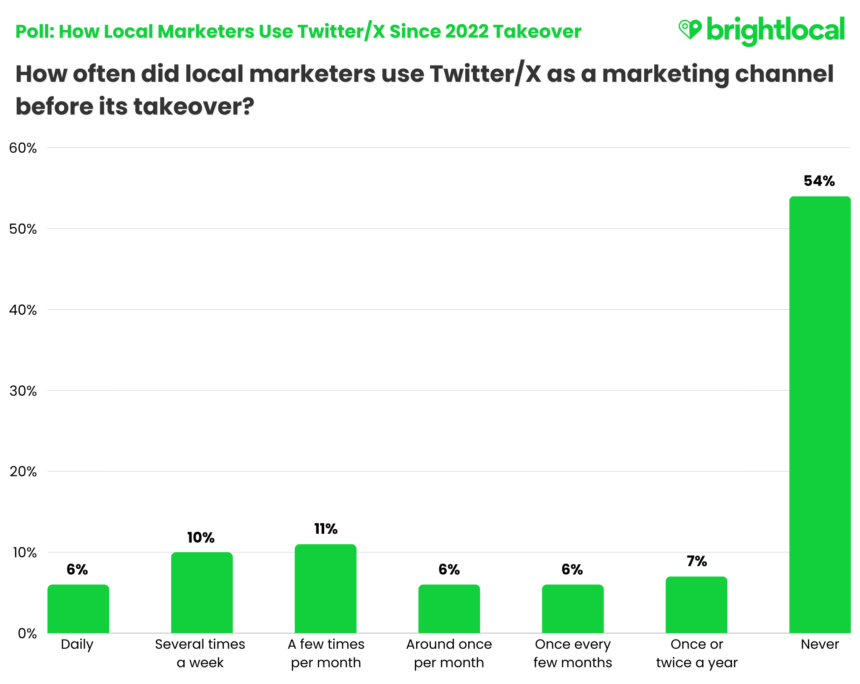
- 54% of local marketers were never using Twitter as a local marketing channel.
- 33% of local marketers used Twitter as a marketing channel at least monthly, prior to its takeover.
Quite astoundingly, more than half of local marketers said they never used Twitter for local marketing in the first place!
Or perhaps it’s not so surprising. Twitter was often seen as the go-to social platform for ‘microblogging’ and community building and, given the highly contextual nature of Twitter threads and discussions, it can be a tricky social media channel to ‘master’. Simply scheduling a few posts a week and spitting them into the ether won’t do. Business owners and marketers have to dedicate a lot of time into understanding how their audience engage.
So, that leaves us with 46% of local marketers using the platform as a marketing channel, and 33% that were using it pretty regularly—at least once a month.
How did Twitter usage change after the takeover?
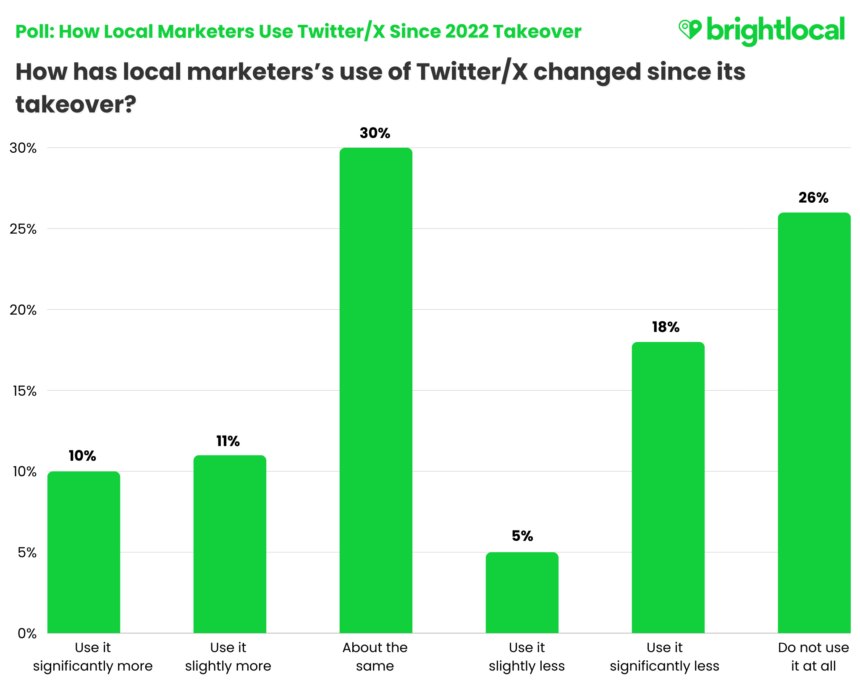
- 26% of local marketers now do not use Twitter/X at all for marketing.
- Twitter/X usage has not really changed for 30% of local marketers.
Of those local marketers that did use Twitter, 26% have said they now no longer use the platform at all since the 2022 takeover and subsequent rebrand. So that’s over a quarter that could have moved to an alternative platform, or ramped up their marketing activity on other social channels already used.
Shortly after the October 2022 takeover, a flurry of excitement grew around Mastodon. Although not new by any means, Mastodon offered former Twitter fans a familiar environment, while running as a decentralized, non-profit social channel. Over a million users flocked to join at the time and, despite numbers dipping again, as of July 2023 it appears to be on the rise once more.
And if they didn’t join Mastodon, there was also the boom in Threads users when that launched in July 2023. Meta’s challenger app, cleverly tied into Instagram, finally gave Instagrammers a place for text-based communication with an existing audience. Yet despite gaining 100 million users in less than a week, active users were said to have plummeted by August.
And so it follows that 30% of local marketers are using X just about the same amount as they used Twitter. Given the amount of us still calling it Twitter (I’m not sure I’ll ever comfortably say X without following up with “or Twitter or whatever”), and the challenger platforms maybe not quite giving the alternative people were hoping for, maybe not that much has really changed?
Bottom line: do local marketers see X as an effective marketing channel now?
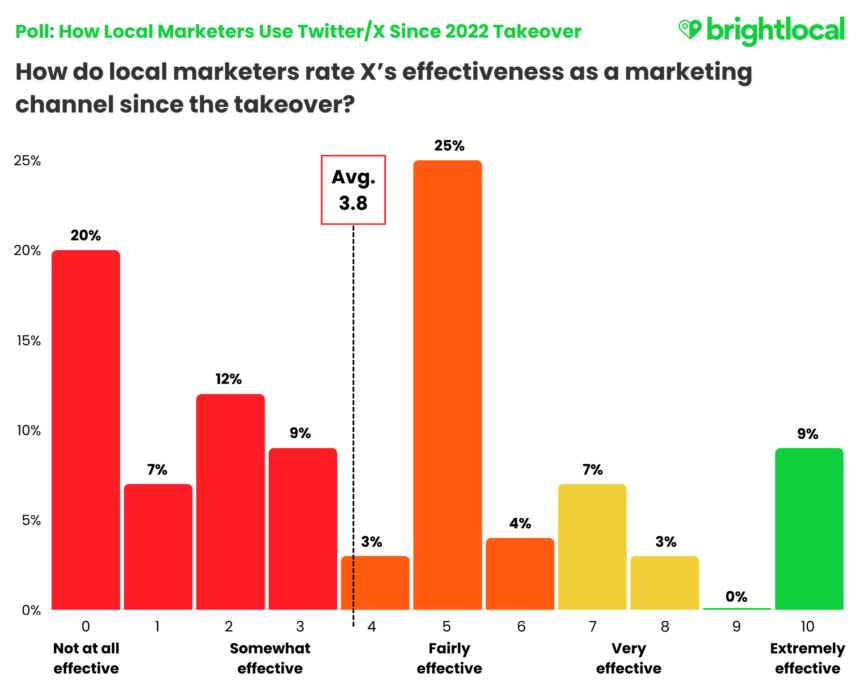
- Twitter/X averaged a 3.8/10 for effectiveness as a local marketing channel.
- 20% of local marketers said they do not think Twitter/X is effective as a marketing channel at all.
- 76% rated X’s effectiveness as a five or less out of ten.
Again, personal opinions aside, we wanted to measure what local marketers think of X now. So we asked them how they rated its effectiveness as a local marketing channel, from zero to ten. It averaged a not-so-great 3.8 out of ten.
A quarter of local marketers rated X’s effectiveness in the middle—not good, not bad—and a fifth said “nope, not at all”.
If we compare these results to the graph displaying how marketers use X now, you see a similar pattern. So it comes down to the the real question of: why are local marketers using X if they don’t think it’s particularly effective?
What social media channel do local marketers rate as most effective?
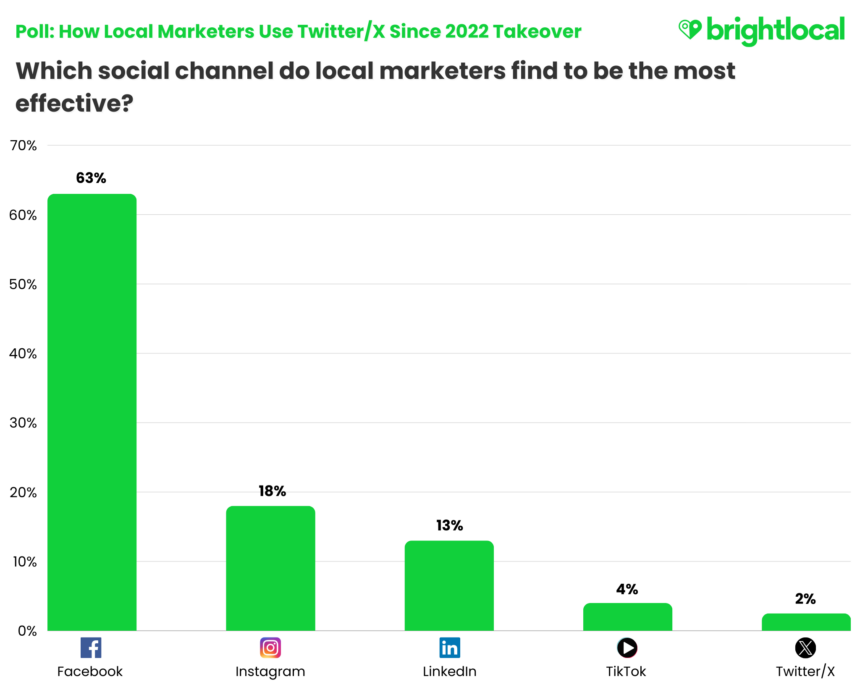
- 63% of local marketers rate Facebook as the most effective social channel for local marketing.
- Just 2% of local marketers see X as the most effective social channel for local marketing.
Finally, we pitted X against other mainstream social platforms and asked local marketers simply which one they find to be the most effective. Facebook comes out on top by a mile, with 63% of local marketers rating it as most effective.
In our recent Local Business Discovery and Trust Report, consumers highlighted Facebook as the fourth most used and trusted platform for local business discovery, sitting next to Google, Google Maps and a business’s own website. When asked purely about social channels used for business discovery, 59% of consumers said they regularly used Facebook.
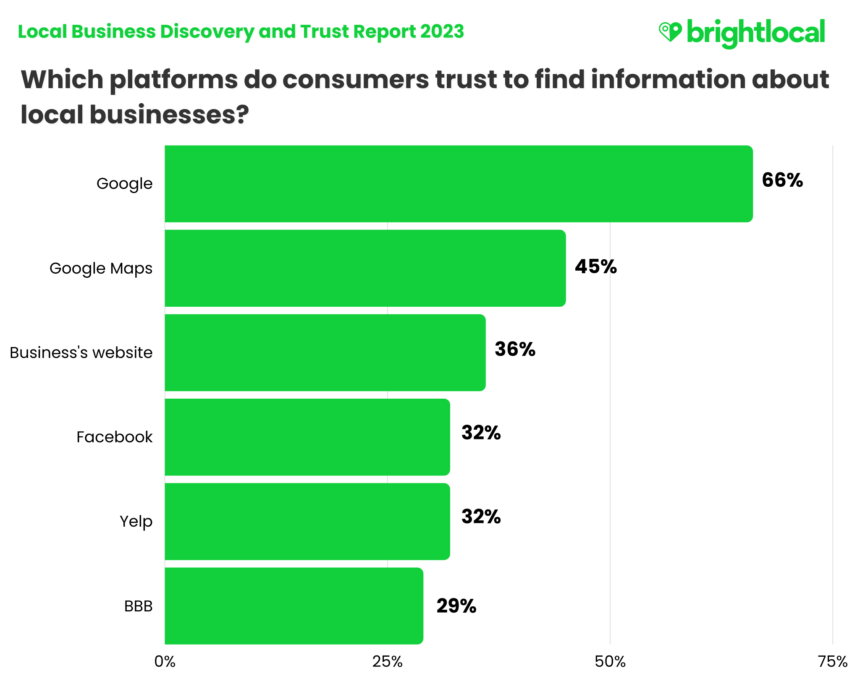
So, it makes sense that local marketers will find a social media platform effective if their audience are actively using it.
What can we learn from these results?
As noted within the section on X’s effectiveness as a marketing channel, we can see a fair chunk of local marketers are using X more or less the same as they did Twitter. With such a significant amount of them saying they don’t feel it’s effective, why are they there?
Mastering social media as a business owner is tough. Even for social media specialists, it can feel like you have to ‘keep up’ with all of the platforms. If this is you, consider some of these tips for social media in local marketing.
Where does your audience spend time online?
Bring it back to basics and reconsider who your target audience is. Sprout Social is a great resource for up-to-date social demographics and user stats, and even provides tips on the most engaging content types per channel.
And if you’re feeling stuck, find out where your competitors are! It’s easy enough to find which social channels your competitors are using—they may even list them in their website footer or on their Google Business Profile.
Want to take it a step further? Check out this guide on monitoring your local business competitors on social media. We also have a handy list of some of the top social media tools.
Remember the core purpose of social media
Yes, social media can be utilized to drive revenue, but it’s always worth reminding yourself that this should not be your key goal. It could be that you’re present in some of the right places but not really considering what’s important to your audience.
Visibility, engagement and trust are vital elements of the awareness and consideration stages of the marketing funnel. Consider:
- Visibility: Is your business or brand present on the right channels? Does your brand identity and core business information (Name! Address! Phone Number!) match up consistently so that you can be found?
- Engagement: Can users see evidence that you’re actively engaging with your audience? Are you responding to customer queries and issues, not just the positive feedback and good reviews?
- Trust: ‘Real’ content, behind-the-scenes stuff and even sharing your team members can help to build trust with your audience. Combined with the above elements of visibility and engagement, it shows authenticity and helps users verify that you are who you say who are.
Share your thoughts with us
Did these results surprise you? We’d love to hear your thoughts! You can reach us over on X, via our Facebook community, The Local Pack, or by emailing the research team.
![[Poll] 49% of Local Marketers Use Twitter/X Less or Not At All Since Takeover](https://www.brightlocal.com/wp-content/uploads/2023/11/Blog-Header-1-700x463.png)
